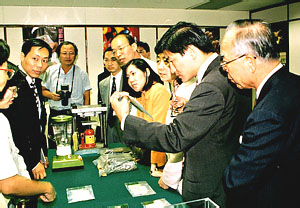



















 ACAN members given a first-hand look at the work of the Narcotics Bureau |
LAST week the Commissioner for Narcotics, Clarie Lo, told the Action Committee Against Narcotics that the number of drug abusers reported in the first half of 1997 in Hong Kong dropped by 13 per cent to 11,060 compared with 12,719 reported in the corresponding period last year. ¡@The Action Committee Against Narcotics (ACAN) was formed in 1965 and is the sole advisory body of the government on policy matters relating to the eradication of drug trafficking and abuse in Hong Kong. The committee monitors and reviews the effectiveness of the drug treatment programmes undertaken by |
|
the government and voluntary agencies and advises on the allocation of resources.
There are three sub-committees
under ACAN, namely Preventative Education and Publicity; Treatment and Rehabilitation;
and Research. Members of the committee under the chairmanship of professor Chen
Char-nie, JP, include distinguished individuals from the fields of social work, education,
medicine and community service, as well as the Commissioner for Narcotics and the
Director of Health.
¡@Mrs Lo said: "The invaluable public support to beat drugs has been the result of high profile anti-drugs preventive education and publicity programmes implemented by the Government of the HKSAR and voluntary agencies, coupled with the effective law enforcement actions by the Hong Kong Police Force and the Customs and Excise Department. ¡@"However, we are not complacent. We will continue to closely monitor the drug abuse trends and figures, to step up preventative education campaign and to continue our vigorous efforts to stop the illicit trafficking of drugs." ¡@The major drugs abused were heroin (87.6 per cent), cannabis (7.3 per cent), triazolam (3.9 per cent), methylamphetamine or "ice" (3.9 per cent) and cough medicine (2.6 per cent). ¡@The meeting was also attended by Tan Seck-kang, Deputy Director of the Central Narcotics Bureau in Singapore. Mr Tan was appointed as a member of ACAN in Hong Kong with a view to enhancing greater understanding and co-operation on anti-drugs policies and activities between Singapore and Hong Kong. ¡@Immediately after the meeting, ACAN members visited the Narcotics Bureau in Police Headquarters where they were given a first-hand look at the work of the Bureau. They were briefed by the Bureau's Chief Superintendent Henrique Koo Sii-hong on the investigation drug offences and liaison with overseas drug enforcement agencies. ¡@Members were informed that the work of the Narcotics Bureau is further reinforced by each Police Region and District which has its own specialised drug enforcement unit targeting local levels of drug trafficking, distribution and abuse. This enforcement strategy has produced outstanding success in terms of seizures and arrests both at home and overseas. ¡@CSP Koo said: "Hong Kong's law enforcement agencies put constant pressure on the illegal drugs trade. Hong Kong is no longer considered to be a major transit centre for No. 4 heroin bound for Europe or North America." | |
|
| |
 CTPB officers familiarise themselves with over 800 traffic regulations |
THE Central Traffic Prosecutions Bureau was established in 1974. The bureau currently has about 250 staff which includes one SP, three CIPs, 22 IP/SIPs and more than 80 JPOs. ¡@One of its major function is to deal with complaints raised by members of the public who receive fixed penalty tickets issued by patrolling officers in the districts. Bureau members are also issue all traffic offense summons and warrants. ach month a team of 34 officers process about 1,400 traffic warrants each month. |
|
¡@The bureau also deals with about 1,000 public telephone enquiries and about 30 counter queries each day. In addition, about 20 drivers per day apply for their personal traffic records which are often required for immigration purposes or when applying for employment requiring driving skills. ¡@"Officers who work here have to familiarise themselves with more than 800 road traffic regulations - a necessity when dealing with daily enquiries and complaints on unjust issue of Fixed Penalty Tickets or traffic offense summons," says WSP Mariana Cheung Fung-yee, who is currently looking for colleagues with a traffic background or a special interest in this field to apply for transfer to the bureau. " ¡@As all complaints on Fixed Penalty Tickets, and traffic summons as well as traffic warrants are handled by our officers, you will definitely become a traffic regulation expert after you have worked here for a period of time."Service in the bureau ia a good chance for career develop. Many post deal with different cases each day. Jobs in CTPB are interesting and challenging. ¡@Between January and July of this year the CTPB received 21,039 complaints about unjust issue of Fixed Penalty Tickets with regard to parking and moving offenses. Thirty per cent of those were withdrawn after being investigated. "If patrolling officers of the districts had a better understanding of traffic regulations, the complaint figures as well as the number of withdrawn Fixed Penalty Tickets would be lowered," said WSP Cheung. ¡@Apart from gaining an in-depth understanding of traffic regulations, officers of the CTPB invariably are exposed to and become extremely knowledgable in the field of information technology through the use of the Vehicle Licensing Integrated Data System (VALID) and the Computerised Case and Summons Management System (CASEMAN). Meanwhile, staff who man the customer service counter gain invaluable experience and skills in dealing directly with the public. ¡@SP Cheung said the team's work on the execution of warrants will cease at the end of the year and the related work will be decentralised to the district fromations in accordance with Police Study Team recommendations. A Headquarters Order will be circulated one month before enforcement. ¡@"However,"said SP Cheung,"as some of the officers who have worked in the team for a long period of time are leaving, there will be vacancies for those interested in this fascination area of traffic management." ¡@It is hope that some younger officers of inspectorate rank will be interested in joining CTPB. The service period for new staff is one-to-two years so more officers can bring what they learn from the bureau back to their formations. | |
|
SINCE April 1980, academic qualification for entry at Recruit Police Constable (RPC) rank has been set at completion of five full years of secondary education. However, applicants with a Form 3 education standard and two years of working experience relating to police service can still be considered for appointment. ¡@Over the past nine years, however, the number of applicants with Form 3 academic qualification has dropped substantially, from 29.3 per cent of the total number of applicants in 88/89 to 3 per cent in 96/97. On the other hand, the number of applicants who are academically qualified to be appointed as inspector has increased from 8.4 per cent of the total number of applicants in 88/89 to 14 per cent in 96/97. ¡@A review of RPC taken on strength over the past years has revealed a very small number of RPC recruits with Form 3 standard. It ranges from 1.3 per cent of applicants in 93/94 and 94/95 down to 0.05 per cent in 88/89. The trend continues with only 3 candidates appointed as RPC in 1996/97 representing only 0.4 per cent of the total RPCs. ¡@To rationalise the situation, the Force addressed the Secretary for the Civil Service recommending the minimum academic qualification for entry at Police Constable level be raised to Form 5. Approval was recently given by the Civil Service Bureau for the Force to implement such changes effective from 29 August 1997. ¡@The adjustment, which is to recognise and formalise the present recruitment situation, will not have any cost implications to the Government or the Force nor will it have any effect on the existing pay scale for police constables. It would however enhance the management of recruitment resources and provide quality service to potential applicants. The ultimate goal is to ensure that the Force is recruiting and retaining the right calibre of person for the job. ¡@Commencing 1 October 1997, all applicants who are not in possession of a pass in a Chinese language subject in the Hong Kong Certificate Education Examination will also be required to undertake a Chinese language proficiency examination which includes a compulsory Chinese composition test. The papers will be marked by qualified teachers who are recognised by the Civil Service Examination Unit. ¡@The higher education requirements for new recruits will enhance both the prestige and the standing of the Force in the eyes of the public. |

![]()
